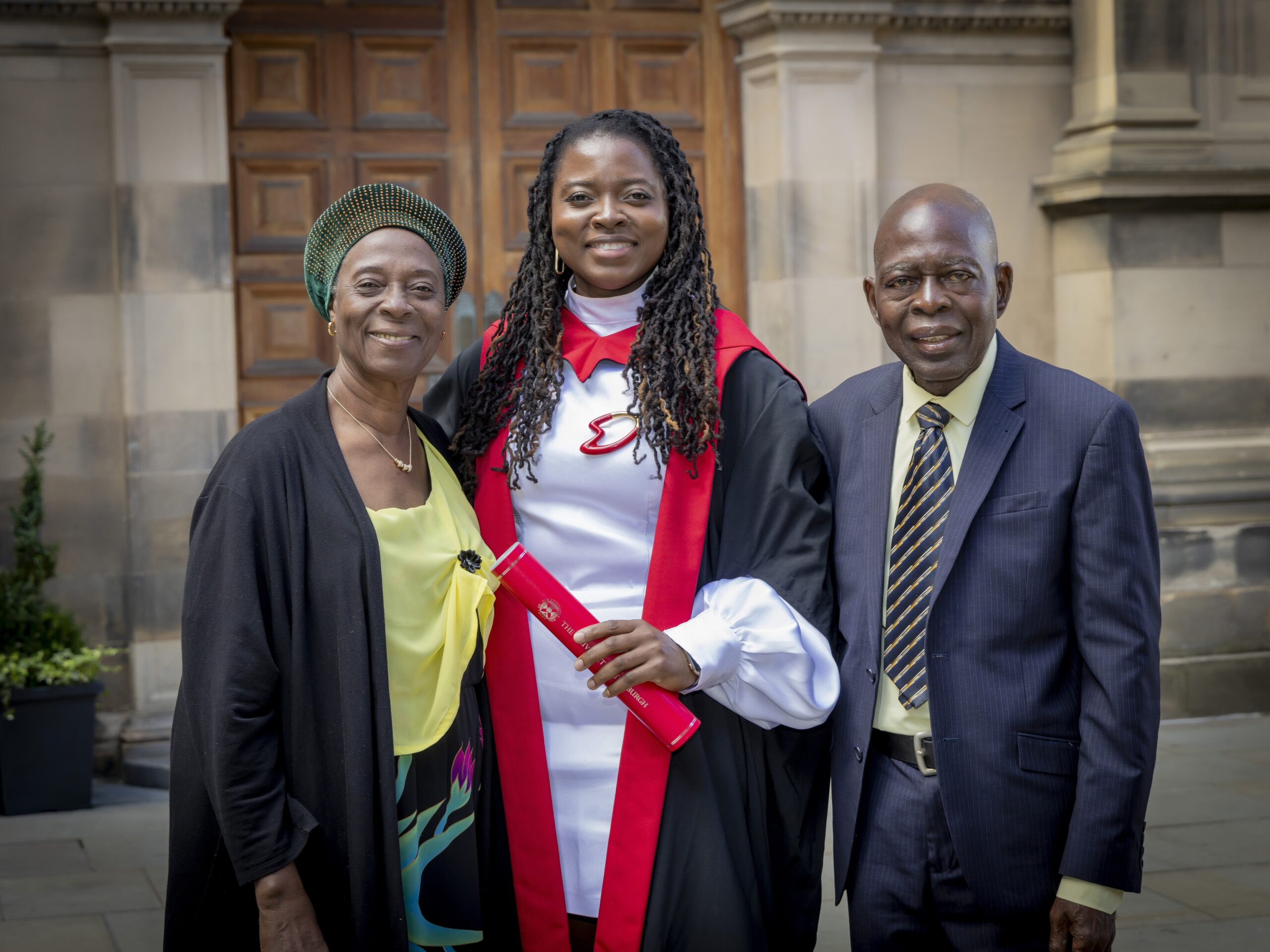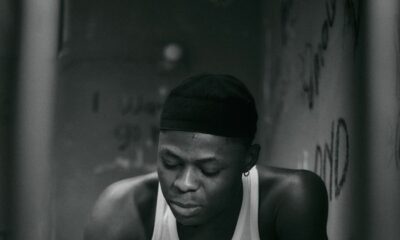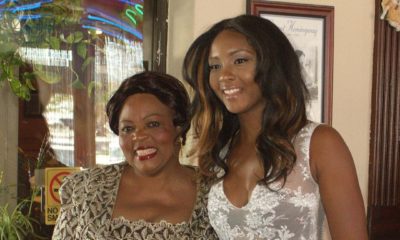Features
Dotun Ayeni: How My Mother Will Be Remembered–A Tribute

My mum, Elizabeth Olufunmilayo Asipa, passed on Saturday, May 3, 2025. She would have been 72 on May 9, 2025.
I got the call around noon on the day. I was at my health club’s pool, and after having a good swim, I received the call on my way out of the club. I missed the first call, but it came back almost immediately. It was from my sister, Tobi. Immediately, I heard the tone of her voice, I sensed what was coming and braced myself.
‘‘Sister Dotun, mummy has passed on oh,’’
I felt the pain and anguish that accompanied those words as she tried to remain calm. You see, Tobi, a medical doctor, had been at Mum’s side since she took ill late in March. Her experience with the medical practice in Lagos and Ondo was a blessing that helped us all manage the process of my mum’s illness. But this? Losing my mum? This was different.
Who my mum was
My mum was an ordained Reverend at the Foursquare Gospel Church in Nigeria and a Secondary School Principal who retired as a Deputy Director of Education in Lagos State. She was a fervent believer in the power of Jesus to heal and make her whole. She would go to God in prayer first if she felt something was amiss in her body.
Some of her beliefs were an outcome of her upbringing and the values instilled in her. Her father, my grandfather, Gabriel Olorunsola Johnson, was a Reverend at the Apostolic Faith Church–a church founded on the doctrine of shunning hospitals and modern medical intervention. If you were sick, healing came through faith, holiness and prayer. It is unclear if these values still hold strongly today, but those were the values propagated in the church where she was raised.
My grandfather passed on Monday, 26th May 2003, after a brief illness. My mum would remind us of how her father never went to a hospital and never liked to bother anyone. She would remind us she was by his side when he died and that he was only sick briefly. That she was the only one he prayed for before he gave up the ghost. My mum loved her father to a fault. She made every effort to instil pride in us for being Gabriel Olorunsola Johnson’s grandchildren–a man of faith who served God fervently until the very end. She expressed it without mincing words that we were special children and carried a special kind of grace. She made sure we never forgot this.
Although she later moved on to a Pentecostal church, Mum continued to believe deeply in the importance of faith. In fasting and in praying. She told everyone who cared to listen that we wrestled not against flesh and blood, but against principalities and powers. She reminded us, her children (including friends, neighbours, and others), at every chance, to be fervent in our prayers and to never give the devil a chance. She was a preacher, an evangelist, a prayer warrior. Always one to see yet another vision, yet another revelation.
My mum strongly believed in her authority as a child of God. She would say, ‘‘You don’t know the kind of mother you have.’’ Mum believed she was on a mission and cited this mission whenever she was challenged or reasoned with. She would remind us, constantly, of the authority we had as children of God to cast down arguments, everything that exalted itself against the knowledge of God, and to bring every thought to captivity. She would tell us how the Holy Spirit had just instructed her to do one thing or the other. She never took an action outside of what she heard from the Holy Spirit. That was my mum.
My relationship with my mum
I had a complicated relationship with my mum. She was strong-willed, outspoken and assertive. I, on the other hand, also being strong-willed, am more measured and calmer. This meant we clashed often on different matters. She was a disciplinarian who was difficult to persuade once she had made up her mind. She was fierce and unrelenting, and she pretty much had the last word in all arguments, even with my father.
I remember being accused of doing something I had not done in my teenage years. But Mum, being Mum, had made up her mind. She dragged me out from under the table, where I was hiding, to make sure I was disciplined and set straight. I swore to myself not to return home after I left for my undergraduate degree at the University of Ibadan. I look back at those days now and laugh.
You see, Mum played an important role in my life. Not just in my upbringing, but in ensuring I took my education seriously. She was a schoolteacher who believed that the only way to succeed was to excel academically. I hated maths, so she hired a teacher from her school to tutor me. She reminded all of us that we only had one chance to do our senior school leaving examination, and that any child who didn’t do well would end up selling pepper in the market or becoming a bricklayer (not that there is anything wrong with these professions, but in Nigeria, where most parents value professions like Engineering, Medicine and Law, it was an effective threat). With subtle threats, supplications, and convincing arguments, we were encouraged to take our education seriously and pursue a university education.
Mum, through her actions, showed me how to love and be there for people. At Christmas, even if we barely managed to scrape things together to cook, she would make sure we took out food to neighbours. During my time at the University of Ibadan, she wasn’t one to say goodbye at the door. No. She took us down to the bus park and made sure she waited until the bus was full, praying silently as she chatted with the bus drivers and conductors, secretly soaking everything in sight in the blood of Jesus, including the driver, the conductors, and all the passengers. I always wondered if anyone sensed this. She would wait until the bus departed, waving and praying. That was my mum.
We fought and sometimes strongly disagreed on our perspectives. However, as I became a woman, a wife and a mother, my view of my mum shifted to respect and admiration. She was always there for us–birthdays, weddings, naming ceremonies, Christmas, New Year’s Day, all of it. Across the sea, she travelled to be of help; and when I needed someone to be with my girls in Scotland while I was thousands of miles away in Nigeria, there she was again, present, available and ready to give her all. She had our backs.
My mum was a good woman. A woman who struggled against all odds to make sure all her children excelled and did well. She had her faults, but her kindness, love and strong, unwavering spirit dwarfed those faults. Her strength held our family together for so many years. No one could escape the tough, spirit-filled, demon-casting matriarch she was. You could love her or hate her, but you couldn’t escape her.
Marking her birthdays
Mum liked celebrations and sometimes minded too much what people thought. Though she wasn’t one to spend frivolously, she made a big deal of milestones and always tried to mark these well when she could. I remember she celebrated her 50th birthday in church and at home, surrounded by friends, family, and colleagues. Spending on this wasn’t convenient at the time, but she treated herself to a nice 50th birthday celebration.
For her 70th birthday in 2023, she told me she would go to the market to get different clothes to sew. That the Holy Spirit had told her to celebrate, look good and buy different clothes to wear. So, she set out to the market in Lagos and bought different clothing materials to sew. Not being one to take pictures or use makeup, she didn’t mind me hiring a makeup artist to do her up and a photographer to take her photos.
On her 70th birthday, she celebrated like she had never done before — changing and wearing about five new, different outfits, all of which were new. Being away in Scotland and trying to complete my PhD didn’t stop me from following the celebrations closely from afar. She was happy, content, and couldn’t stop talking about how glorious her 70th birthday was. It was one of the pictures she took on the day that we would eventually choose as the lead photo for her funeral. Before then, she had not taken professional photos in recent times, which meant we would have had no good photos to select from for her funeral. Yet again, she’s convinced us why she’s completely yielded to the holy spirit.
Mum’s illness
In March 2025, my mum called me to say she hadn’t been feeling well and would be travelling to Akure to see Tobi, who works at the Federal Teaching Hospital. She said she would try to get some care at Tobi’s hospital and asked me to pray along with her. She mentioned having shortness of breath, and I was a little worried. But I was happy that she was open to going to the hospital to be checked by a professional. Alas, that happiness did not last.
Mum was admitted immediately with suspected fluid retention in her lungs (pulmonary oedema). Further investigations revealed ongoing bleeding and suspected cancer. The immediate treatment was to place her on medications to stop the fluid build-up, drain the fluid from her lungs and control the bleeding. For a woman who never had a major health crisis, and whose perhaps only major concern was the knee she had hurt in childhood and managed since then, we were all worried.
After further tests (a scan), the doctors discovered Mum had cancer in her uterus, which had already spread to other parts of her body, especially her liver and the lining of her stomach. They had initially mentioned that they would try to remove her womb, but the results of the tests showed it was spreading rapidly. We (the children) immediately called a meeting to discuss the matter further and determine next steps. Overwhelmed with what the diagnosis portends, I reached out to my dear friend Damola, who put me in touch with another friend, Dr Abdulzeez, an oncologist.
Azeez asked whether a biopsy had been done, and we said no. Azeez asked, ‘‘If they’ve not yet done a Biopsy of the uterine mass, may I ask what they’re waiting for?’’ You see, we were certain it was cancer, given the scan results; however, Azeez made us realise that while scans can indicate cancer, a biopsy of the mass must be done to confirm cancer. Azeez recommended Lakeshore Cancer Centre in Lagos, which admitted Mum for a thorough cancer investigation.
At this stage, we had not told my dad about the diagnosis since we didn’t want him to worry. We were more concerned about getting my mum the care she needed and fast. We told my mum about our plans to move her, and, Mum being Mum, refused to be moved. She told us she was okay where she was and didn’t want to go anywhere. I suspect this was due to fatigue and a reluctance to bother anyone, but we cajoled and argued with her, and eventually made her see reason. She had trained us for such a time. Raised children who would make good decisions on her behalf. She had done enough, and it was time for us to step in.
We were grateful for the care she had received in Akure, but it didn’t seem they were well-resourced to handle cancer care or to provide standard inpatient supportive/hospital ward care. Tobi had had to take over her bath and other care, sometimes sleeping in the car park to ensure she was near. Even with Tobi’s hawk-eye attention, Mum had developed pressure ulcers. Those were trying days. Tobi took a leave of absence from work and brought my mum down to Lagos for intensive cancer care.
Mum’s care in Lagos and death
Mum was admitted to the cancer centre in Lagos on 17th April, where she received excellent care and attention. At this time, she had lost a significant amount of weight because she had not been eating. However, after a few days, Mum slowly regained her appetite and appeared to be better. On the 19th, I called Mum and was relieved to see how well she was doing. I added my other siblings to the call, and we had a long chat. She said she was doing much better and remarked that the centre was much better than the teaching hospital in Akure–those words were music to my ears. I said, “But Mum, remember you didn’t want to be moved to Lagos?”
She said, “Mi o mon nkan ti mon so ni gba yen ni.” In English, “I didn’t know what I was saying.”
We were concerned about how much weight she had lost. Mum, again being Mum, joked and said, “I’ll be the slimmest, trendiest grandma in town when I get out of here.” We all laughed.
The good people at Lakeshore helped get Mum into a much more stable condition and informed us they would discharge her on 23rd April as she could now walk, was talking and eating better. The plan was to conduct further tests on her as an outpatient and determine the best course of treatment–whether immunotherapy or chemotherapy. They felt she would benefit from the treatment and respond well.
Alas, this was not to be.
In the early morning of May 3rd, the fluids that had previously been retained in her lungs returned, and she once more became breathless. She was rushed to the nearest hospital at Idi-Araba. It was while she was about to be admitted for breathlessness that my dear mum gave up the ghost.
Mum was buried on the 17th of May in Lagos, Nigeria, surrounded by her husband, children, cousins, nieces, nephews, in-laws, her classmates from secondary school, work colleagues, church colleagues, friends and many more she touched while on earth. I was asked to give a tribute during the church service, which I did not prepare for. How does one find time to give a tribute while also preparing a funeral programme, reserving the grave site, and making sure the caterers deliver food on time? I gave the tribute I was asked to, but the words were far away.
Grieving my loss
I am still coming to terms with the loss of my mum. This is why I write. As the tears well up again today, I reflect on the life she lived. I’ve lost people in the past–in-laws, friends and others. But the loss of a mother, my mother, is incomparable. Mum’s death leaves an indelible mark. But I am grateful for the support of family, friends and colleagues who have stood by me. By us. For the support my dear father and my siblings have received. Death has a way of humbling one, but it also shows how people care (or don’t).
Grieving is a process. It shows our humanity and vulnerability. Grief has no timetable, and one can never know when it will end or if it will ever end. But I suppose time and living are the resources we have to help us cope. Life will go on, and as life goes on, time steps in. Some days may be good and others unimaginable.
I’ve been spending more time with my girls and husband in the past few months. My sixteen-year-old has taken a keen interest in the series Desperate Housewives, which premiered in 2005. We’ve been seeing the show together and discussing the flaws and strengths of the various characters. Sometimes, in your grief, you never know what can help, but a scene from the show has somewhat helped and remained with me.
In Season 4, episode 4, titled “Welcome to Kanagawa,” Lynette helps Ms McCluskey (an older friend) spread her best friend, Ida’s ashes, on a baseball pitch they had brazenly broken into. Before they spread the ashes, Lynette asks Ms McCluskey to say a few words. The words she spoke were so poignant that I had to look them up. They were taken from a poem titled ‘Immortality’, written in 1934 by Clare Harner, and sometimes attributed to Mary Elizabeth Frye. It goes:
Do not stand by my grave and weep,
I am not there, I do not sleep.
I am a thousand winds that blow,
I am the diamond glints in snow.
I am the sunlight on ripened grain,
I am the gentle autumn rain.
As you awake with morning’s hush,
I am the swift, uplifting hush.
Of quiet birds in circling flight,
I am the day transcending night.
Do not stand by my grave and cry,
I am not there; I did not die.
That poem stopped me in my tracks and encapsulates how my mum lived, what she believed and represented (and still represents).
Mum, your spirit is very much alive. I remember you when I lay my head down to sleep and when I awake. I remember you when I pick up the Bible to read. I remember you when it rains and when the stars shine. Although the grave holds your body, your spirit and your soul did not die. They live forever, in my heart, in the hearts of all your children and grandchildren, and in the hearts of everyone you touched.
Enjoy the hereafter, dear mum. You lived, you saw and did it all.




















